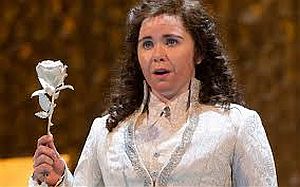Removing the Magic from Mozart
From The American SpectatorJoshua Hopkins (Papageno), Maureen McKay (Pamina)
Recently, my wife and I attended a performance of the Washington National Opera’s version of Mozart’s Magic Flute — which, in case you don’t know, is what German speakers call a Singspiel opera, written in the vernacular and intended for a popular audience. In this it was unlike the others among Mozart’s most famous operas, which were written to Italian libretti and intended for a more aristocratic public — though most were also performed in popular, vernacular versions. The WNO was staging it in an English translation by one Kelley Rourke who, besides having the ear for rhyme of your average rap or hip hop artiste — which is to say, hardly any ear at all — managed largely to extract any residual sense of sex-difference from the opera’s tale of a young prince’s quest to find and rescue a young princess from imprisonment by (so he is told) an evil sorcerer. You might almost call it magic.
In act one, for example, there is a sublimely simple duet between the young Princess, known as Pamina, and not the young prince but the comic lead, who is called Papageno. It is conventionally known by its first line in German, Bei Männern, welche Liebe fühlen, and its refrain goes like this:
Mann und Weib und Weib und Mann,
Reichen an die Gottheit an.
Or, as we might sing, fitting it to the music,
Man and wife and wife and man
Together they’re a Godlike pair.
But in Ms Rourke’s translation it becomes:
Heart to heart and soul to soul
Love alone will make us whole
Love alone, eh? Well, love plus a healthy dose of political correctness. It’s a neat trick, anyway, to have excised any hint not only of sex but also of religion from these two lines about marriage. Elsewhere, the production also removes any reference to race, though as Mozart’s librettist Emanuel Schikaneder wrote the part, the villain, Monostatos, is supposed to be a black man and is recognized as such by the other characters. On the night we saw the show, he was played by a man of indeterminate race in whiteface, though no hint of the reason for this peculiar maquillage is given in Ms Rourke’s translation. Accordingly, there is also no reference to the devil, which is what he and Papageno call each other on their first meeting, at least as Schikaneder wrote it. W.H. Auden proves to have been prophetic when he wrote in his “Metalogue to The Magic Flute,” produced for the bi-centenary celebrations of Mozart’s birth in 1956:
Monostatos must make his bad impression
Without a race, religion or profession.
Even Auden couldn’t have foreseen the de-sexing of Pamina, though as a homosexual he will doubtless already have been posthumously conscripted into the cause of gay marriage, wherein notions of Mann and Weib (not to mention Gottheit) are either obsolete or fantastical. I think Auden would have been bemused by and unhappy with the idea. He was, after all, a professing Christian, and of his homosexuality he said with typical irreverence: “Of course it’s wrong. We must just hope that Miss God will forgive us.”
That piquant take on the matter, like the world of Mozart and Schikaneder, is rapidly becoming incomprehensible to modern audiences who, if they think about the matter at all, must suppose that these 18th century Austrians looked at life more or less as they themselves do. Certainly, those who produce plays and operas by long dead writers consider it part of the job to avoid any reminders that they didn’t. Accordingly, we are all now accustomed to what The New York Times has called, a propos of a new production of Mozart’s Cosi Fan Tutte in Los Angeles, a “culminating vision — not thoroughly worked out — of pervasive androgyny.” How often, by the way, do we find that that particular vision is “not thoroughly worked out” — especially when it is applied to the works of people who, when alive and writing, would have had no idea of what it was. Surely it is only the fact that music is normally written for either male or female voices which has so far prevented opera, like the movies (interestingly), from following the theatre into the murky ways of “gender-blind casting,” about which I have written in this space before (see “Culture Benders” in The American Spectator of November, 2008 and “As She Likes It” in the issue of April, 2013).
For you couldn’t really call female singers in what are known as “trouser roles,” such as that of Cherubino in Mozart’s Marriage of Figaro, an example of gender-blindness. On the contrary, “gender” distinctions are only accentuated by mezzo-soprano voices of women pretending to be boys — the opposite, of course, of Shakespearean stage practice in which boys pretended to be women. As in Shakespeare too, the gender reversal is itself frequently reversed, as when Cherubino is supposed to dress up like a girl. The same thing happens in Richard Strauss’s great opera Rosenkavalier, deliberately modeled on the Mozart operas of over a century earlier, when the mezzo Octavian (known to his married lover, the Marschallin, by the pet name of Quinquin), dresses like a chambermaid. He does so at first in order to cover up the affair, but later it is to play a nasty trick on the Marschallin’s cousin, Baron Ochs, breaking up the latter’s arranged engagement to young Sophie, whom Quinquin has fallen in love with and for whom he will leave the Marschallin after the final, glorious trio sung by the three of them in the third act. The three female voices blending produce quite a different effect from anything a man and two women could do.
 |
As with the cross-dressing, the apparent sexual homogeneity only serves to accentuate the sense of sexual difference, at least in a deliberately archaic context where sexual roles are strongly differentiated as they are in Rosenkavalier. But modern politics dictate that such differentiation can no longer be represented on stage without a deconstructive explication of its oppressive subtext. In the current Rosenkavalier at Glyndebourne, for instance, “Ochs doesn’t just behave boorishly with Sophie; his thuggish, proto-Nazi henchmen plonk her on a table where she is auctioned like a slave.” That, at any rate, is the description of Richard Morrison, the opera critic for the Times of London, who got himself in trouble for a quite different critical stricture. He was one of five critics for five metropolitan dailies who independently mentioned in various and mildly censorious ways that the embonpoint of Tara Erraught, the young Irish mezzo playing Octavian, was a bit difficult to reconcile with the ostensible appearance of her character, a teenage hobbledehoy on the brink of manhood who is supposed inspire powerful feelings of lust in an older woman, an older man and a young girl.
Well, you can imagine the outcry from social media’s feminist invigilators against such male — the critics all happened to be men — “body shaming” and even, in one or two cases, their ungallant attention to anything unhappy or unbecoming in a lady’s physical appearance. That, at least, had the merit of showing that the politically correct can be old-fashioned when it suits them. But as Mr Morrison of The Times wrote by way of apologia, the Glyndebourne production itself had made rather a point of its singers’ appearance by having the curtain go up “on the Marschallin, played by Kate Royal, gyrating — totally naked — in a shower of glitter.” It’s almost enough to make you think that Miss Erraught had been chosen for the role of Octavian, and then dressed in extremely unflattering white satin breeches, precisely in order to elicit some such reaction from the media, which can be relied on to take a keen interest in any kind of on-stage sex — sex, that is, in a sense much more up-to-date than any that would have been understood by Mozart and Schikaneder.
 |
A similar judgement was no doubt made by their latter-day fellow-countryman, Herr Thomas Neuwirth who, under the name of Conchita Wurst (Little Connie Sausage), won this year’s Eurovision Song Contest by singing “Rise Like a Phoenix” in breast-length hair, high heels, a gold- highlighted gown and a full beard. The Danish hosts of this year’s contest had advertised its theme as “Tolerance,” so contestants relying only on their musical talents, if any, could not say they were not given fair warning. Nor could the Russians, whose contestants finished seventh and who were predictably and, to the hypertolerant nations of Europe, gratifyingly outraged. It was, said one Russian politician, “the end of Europe. . . There is no limit to our outrage. It has turned wild. There are no more men or women in Europe, just it.” That is, of course, not quite true. Men and women continue to be born as boys and girls and continue, for the most part, to differ from one another in all the familiar ways, including a desire to play in real life those seemingly long outdated roles of Mann and Weib. But the politicized culture both there and here is increasingly intolerant of any artistic or theatrical expression of such differences, even when they are set in the heavenly music of certain dead white male composers.
Discover more from James Bowman
Subscribe to get the latest posts to your email.







